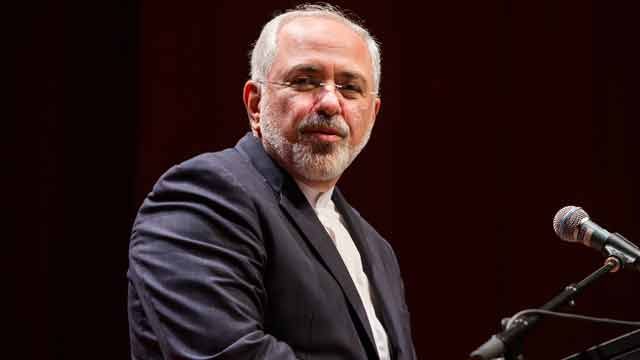Iran’s Foreign Minister spells out the challenges for the Middle East

Dr Zarif addresses an audience at the ANU. Photo by Stuart Hay/ANU
Iran's Foreign Minister Mohammad Javad Zarif has given a public lecture at ANU, outlining his approach to foreign policy.
In his only public speech on his visit to Australia, Dr Zarif said world leaders needed to recognise that in a globalised world, no country can be secure while other countries are facing insecurity.
He said the world needed to move away from security alliances and coalitions, which were exclusive, and work instead towards policies based more on inclusion.
"We need to understand that in a globalised world, we will either lose together or win together," said Dr Zarif, who was introduced by ANU Centre for Arab and Islamic Studies Director Professor Amin Saikal.
"We cannot have security at the expense of insecurity of others. It is impossible to live in an island of security in the turbulent insecure ocean that is our world."
His lecture touched on the crisis in Syria, Iran's troubled relationship with Saudi Arabia, and Tehran's decision to curb its nuclear programs in return for the lifting of economic sanctions.
He said big problems could often be resolved by redefining the questions and objectives, in the same way Iran and the United States finally agreed on Iran's nuclear program.
"For years we had a nuclear problem. Iran believed that since it was living up to its commitments under the NPT (Nuclear Non-Proliferation Treaty) it should not be worried about what others say, that it should not limit its nuclear program. We had a right to have our nuclear technology for peaceful purposes," Dr Zarif said.
"The United States believed that any, even small, nuclear program in Iran, was tantamount to a bomb.
"Iran wanted an unlimited nuclear program. The US wanted a zero enrichment option. We had objectives that were mutually exclusive.
"We decided to define our common objective - Iran should have a nuclear program that will always remain peaceful.
"We wanted to have our nuclear program, they wanted it not to lead to nuclear weapons. The way we defined the objective made it possible for us to reach a resolution."
He said the same approach could be used to bring about an agreement on the crisis in Syria.
"Instead of defining the problem in our region as Iran and Saudi Arabia trying to gain influence at the expense of others, we have to come to the understanding, after having tried all the wrong options, that Iran and Saudi Arabia will suffer together if DAESH, ISIS - the so-called Islamic State that is neither Islamic nor a state - take over Damascus or Baghdad," he said.
"Not only Iran and Saudi Arabia will lose, but everybody else will lose.
"If we start redefining the problem that DAESH is nobody's leverage, that if you see a disequilibrium in the region, the way to deal with it is not to harm your competition, but rather to try to define possibilities, then you can work together.
"I believe we can establish that. I believe we can bring it about.
"If Iran and the United States, which called each other the 'Great Satan' and the 'Axis of Evil', can find the possibility on one issue ... that was the most divisive, that was taking the region and world to the brink of war ... If we could resolve that difficult issue, then why can't those people who call each other brothers and sisters not sit down and redefine the problem, redefine the problem in terms acceptable to everybody.
"We live in a globalised world. You cannot gain at the peril of your neighbour."
Dr Zarif was welcomed by ANU Vice-Chancellor Professor Brian Schmidt, and thanked by Chancellor Professor the Hon Gareth Evans.